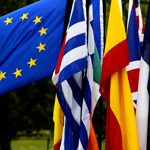How important was the latest deal at the European leaders summit on the eurozone?
It was an important summit, but it was just a step in a multi-year process of redressing the situation. Under any scenario this is not a decisive moment in the crisis. Despite the agreements to tighten fiscal discipline and seek treaty change to cede some sovereignty over fiscal policies, there were three key things that were missing from the latest deal.
First, the European Central Bank has not committed explicitly or implicitly to providing a backstop for the long term. Second, while governments agreed to raise up to $270 billion for the International Monetary Fund to aid indebted countries, this is not enough money for an important, durable solution—or the so-called bazooka that people are looking for. And third, there is no clear path toward fiscal integration and eurobonds that could ultimately resolve the crisis. This is left as a distant possibility with Germany and France at this point dead-set against it.
First, the European Central Bank has not committed explicitly or implicitly to providing a backstop for the long term. Second, while governments agreed to raise up to $270 billion for the International Monetary Fund to aid indebted countries, this is not enough money for an important, durable solution—or the so-called bazooka that people are looking for. And third, there is no clear path toward fiscal integration and eurobonds that could ultimately resolve the crisis. This is left as a distant possibility with Germany and France at this point dead-set against it.
Read more
So the deal reached at the European summit is only a step and leaves many questions unanswered. Much of the burden of the readjustment over the long term is on the countries in trouble. There continues to be a very serious question about their political capacity to follow through with what promises to be many more years of austerity and falling incomes.
The move to a more centralized Europe is the right solution. There are people who say that this is not the issue and won’t calm the markets, but this is actually extremely important. Europe can’t wait to show where it is headed.
Europe is at a fork in the road and can either go for more centralization or fragmentation. There are pros and cons to both, but I think it’s helpful that Europe is choosing the path to greater centralization. MORE►
————————
Hans Timmer is the director of the World Bank's development prospects group.
Hans Timmer
While it moves Europe in the right direction, the latest agreements won’t solve the problems. The deal for greater fiscal discipline will help provide political cover to governments implementing steps—this is important. But what I find best about this effort is the move to revise the treaty to further centralize policies. For that some autonomy needs to be given up.The move to a more centralized Europe is the right solution. There are people who say that this is not the issue and won’t calm the markets, but this is actually extremely important. Europe can’t wait to show where it is headed.
Europe is at a fork in the road and can either go for more centralization or fragmentation. There are pros and cons to both, but I think it’s helpful that Europe is choosing the path to greater centralization. MORE►
————————
Hans Timmer is the director of the World Bank's development prospects group.





.jpg)